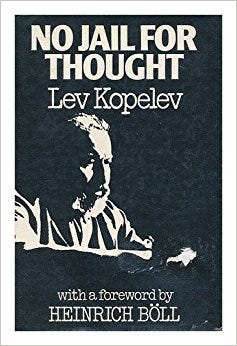While completing an invited essay for a collection of essays by dissident philosophers, I pulled down from the shelf many a volume on Marx and Marxism, including Steven Lukes, Marxism and Morality (Oxford UP, 1987). In the front matter of that very good book I found the following quotation from the hitherto unknown to me Lev Kopelev (emphases added):
With the rest of my generation I firmly believed that the ends justified the means. Our great goal was the universal triumph of Communism, and for the sake of that goal everything was permissible—to lie, to steal, to destroy hundreds of thousands and even millions of people, all those who were hindering our work or could hinder it, everyone who stood in the way. And to hesitate or doubt about all this was to give in to “intellectual squeamishness” and “stupid liberalism,” the attributes of people who “could not see the forest for the trees.”
That was how I had reasoned, and everyone like me, even when I did have my doubts, when I believed what Trotsky and Bukharin were saying. I saw what “total collectivization” meant—how they 'kulakized' and 'dekulakized', how mercilessly they stripped the peasants in the winter of 1932–33. I took part in this myself, scouring the countryside, searching for hidden grain, testing the earth with an iron rod for loose spots that might lead to buried grain. With the others, I emptied out the old folks’ storage chests, stopping my ears to the children’s crying and the women’s wails. For I was convinced that I was accomplishing the great and necessary transformation of the countryside; that in the days to come the people who lived there would be better off for it; that their distress and suffering were a result of their own ignorance or the machinations of the class enemy; that those who sent me—and I myself—knew better than the peasants how they should live, what they should sow and when they should plow.
In the terrible spring of 1933 I saw people dying from hunger. I saw women and children with distended bellies, turning blue, still breathing but with vacant, lifeless eyes. And corpses— corpses in ragged sheepskin coats and cheap felt boots; corpses in peasant huts, in the melting snow of old Vologda, under the bridges of Kharkov....I saw all this and did not go out of my mind or commit suicide. Nor did I curse those who had sent me to take away the peasants’ grain in the winter, and in the spring to persuade the barely walking, skeleton-thin or sickly-swollen people to go into the fields in order to “fulfill the Bolshevik sowing plan in shock-worker style.”
Nor did I lose my faith. As before, I believed because I wanted to believe. Thus from time immemorial men have believed when possessed by a desire to serve powers and values above and beyond humanity: gods, emperors, states; ideals of virtue, freedom, nation, race, class, party. . . .
Any single-minded attempt to realize these ideals exacts its toll of human sacrifice. In the name of the noblest visions promising eternal happiness to their descendants, such men bring merciless ruin on their contemporaries. Bestowing paradise on the dead, they maim and destroy the living. They become unprincipled liars and unrelenting executioners, all the while seeing themselves as virtuous and honorable militants—convinced that if they are forced into villainy, it is for the sake of future good, and that if they have to lie, it is in the name of eternal truths.
Und willst du nicht mein Bruder sein
So schlag ich dir dein Schaedel ein.
[And if you won't be my brother
I'll crack your skull open.]they sing in a Landsknecht song.
That was how we thought and acted—we, the fanatical disciples of the all-saving ideals of Communism. When we saw the base and cruel acts that were committed in the name of our exalted notions of good, and when we ourselves took part in those actions, what we feared most was to lose our heads, fall into doubt or heresy and forfeit our unbounded faith.
I was appalled by what I saw in the 1930s and was overcome by depression. But I would still my doubts the way I had learned to: 'we made a mistake,' 'we went too far,' 'we didn't take into consideration,' 'the logic of the class struggle,' 'objective historical need,' 'using barbaric means to combat barbarism' . . . .
Good and evil, humanity and inhumanity -- these seemed empty abstractions. I did not trouble myself with why 'humanity' should be abstract but 'historical necessity' and 'class consicousness' should be concrete. The concepts of conscience, honor, humaneness we dismissed as idealistic prejudices, “intellectual” or “bourgeois,” and hence, perverse.
Lukes mistakenly refers to Lev Kopelev, No Jail for Thought (London: Secker and Warburg, 1977, tr. Anthony Austin from the 1975 Russian original), pp. 32-34. The passage is not to be found there, and where it is from, I do not know. But the main thing is that I got introduced to Kopelev. It is essential to study communism because that is now the pronounced drift of the Democrat Party in the USA as the battle for the soul of America rages on.
Anyone with eyes to see can spot the ominous parallels between the Soviet horror and what the contemporary Left in the USA has in store for us.



